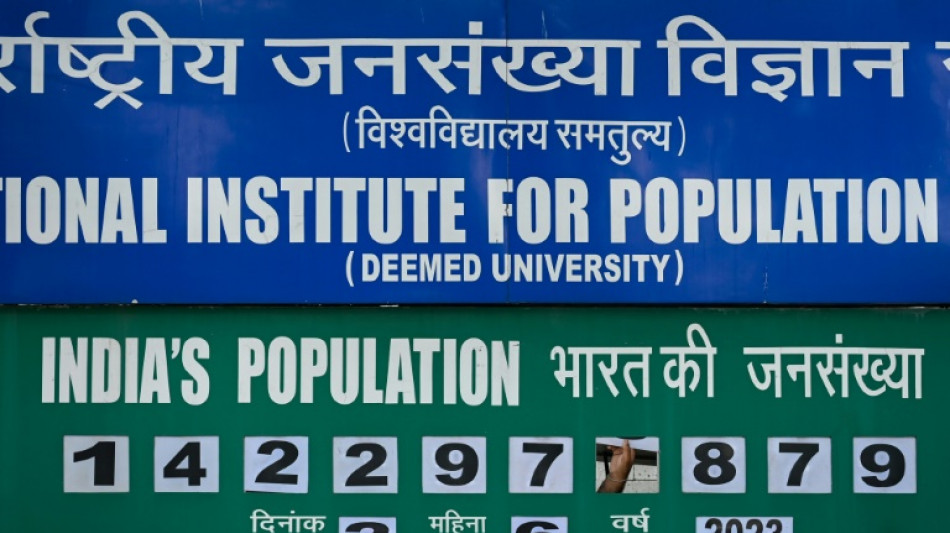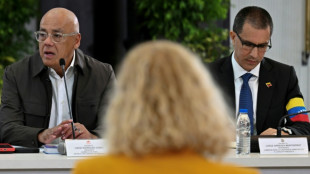
-
 NFL names 49ers to face Rams in Aussie regular-season debut
NFL names 49ers to face Rams in Aussie regular-season debut
-
Bielle-Biarrey sparkles as rampant France beat Ireland in Six Nations

-
 Flame arrives in Milan for Winter Olympics ceremony
Flame arrives in Milan for Winter Olympics ceremony
-
Olympic big air champion Su survives scare

-
 89 kidnapped Nigerian Christians released
89 kidnapped Nigerian Christians released
-
Cuba willing to talk to US, 'without pressure'

-
 Famine spreading in Sudan's Darfur, UN-backed experts warn
Famine spreading in Sudan's Darfur, UN-backed experts warn
-
2026 Winter Olympics flame arrives in Milan

-
 Congo-Brazzaville's veteran president declares re-election run
Congo-Brazzaville's veteran president declares re-election run
-
Olympic snowboard star Chloe Kim proud to represent 'diverse' USA

-
 Iran filmmaker Panahi fears Iranians' interests will be 'sacrificed' in US talks
Iran filmmaker Panahi fears Iranians' interests will be 'sacrificed' in US talks
-
Leicester at risk of relegation after six-point deduction

-
 Deadly storm sparks floods in Spain, raises calls to postpone Portugal vote
Deadly storm sparks floods in Spain, raises calls to postpone Portugal vote
-
Trump urges new nuclear treaty after Russia agreement ends

-
 'Burned in their houses': Nigerians recount horror of massacre
'Burned in their houses': Nigerians recount horror of massacre
-
Carney scraps Canada EV sales mandate, affirms auto sector's future is electric

-
 Emotional reunions, dashed hopes as Ukraine soldiers released
Emotional reunions, dashed hopes as Ukraine soldiers released
-
Bad Bunny promises to bring Puerto Rican culture to Super Bowl

-
 Venezuela amnesty bill excludes gross rights abuses under Chavez, Maduro
Venezuela amnesty bill excludes gross rights abuses under Chavez, Maduro
-
Lower pollution during Covid boosted methane: study

-
 Doping chiefs vow to look into Olympic ski jumping 'penis injection' claims
Doping chiefs vow to look into Olympic ski jumping 'penis injection' claims
-
England's Feyi-Waboso in injury scare ahead of Six Nations opener

-
 EU defends Spain after Telegram founder criticism
EU defends Spain after Telegram founder criticism
-
Novo Nordisk vows legal action to protect Wegovy pill

-
 Swiss rivalry is fun -- until Games start, says Odermatt
Swiss rivalry is fun -- until Games start, says Odermatt
-
Canadian snowboarder McMorris eyes slopestyle after crash at Olympics

-
 Deadly storm sparks floods in Spain, disrupts Portugal vote
Deadly storm sparks floods in Spain, disrupts Portugal vote
-
Ukrainian flag bearer proud to show his country is still standing

-
 Carney scraps Canada EV sales mandate
Carney scraps Canada EV sales mandate
-
Morocco says evacuated 140,000 people due to severe weather

-
 Spurs boss Frank says Romero outburst 'dealt with internally'
Spurs boss Frank says Romero outburst 'dealt with internally'
-
Giannis suitors make deals as NBA trade deadline nears

-
 Carrick stresses significance of Munich air disaster to Man Utd history
Carrick stresses significance of Munich air disaster to Man Utd history
-
Record January window for transfers despite drop in spending

-
 'Burned inside their houses': Nigerians recount horror of massacre
'Burned inside their houses': Nigerians recount horror of massacre
-
Iran, US prepare for Oman talks after deadly protest crackdown

-
 Winter Olympics opening ceremony nears as virus disrupts ice hockey
Winter Olympics opening ceremony nears as virus disrupts ice hockey
-
Mining giant Rio Tinto abandons Glencore merger bid

-
 Davos forum opens probe into CEO Brende's Epstein links
Davos forum opens probe into CEO Brende's Epstein links
-
ECB warns of stronger euro impact, holds rates

-
 Famine spreading in Sudan's Darfur, warn UN-backed experts
Famine spreading in Sudan's Darfur, warn UN-backed experts
-
Lights back on in eastern Cuba after widespread blackout

-
 Russia, US agree to resume military contacts at Ukraine talks
Russia, US agree to resume military contacts at Ukraine talks
-
Greece aims to cut queues at ancient sites with new portal

-
 No time frame to get Palmer in 'perfect' shape - Rosenior
No time frame to get Palmer in 'perfect' shape - Rosenior
-
Stocks fall as tech valuation fears stoke volatility

-
 US Olympic body backs LA28 leadership amid Wasserman scandal
US Olympic body backs LA28 leadership amid Wasserman scandal
-
Gnabry extends Bayern Munich deal until 2028

-
 England captain Stokes suffers facial injury after being hit by ball
England captain Stokes suffers facial injury after being hit by ball
-
Italy captain Lamaro amongst trio set for 50th caps against Scotland


Indian clock tells story of most populous nation
India's first population clock, made up of 10 white numbered cards on a large green metal board, attracts curious passersby who watch it record the story of the world's most populous nation.
The clock -- manually updated every day according to projected estimates and akin to a cricket scoreboard in appearance -- was first erected in 1982 when India was home to more than 684 million people, according to the 1981 government census.
That figure more than doubled in the following decades.
India grew rapidly to overtake China at the top of the population ranks with more than 1.42 billion people, according to a United Nations projection in April.
"An extra slot had already been made in the clock, expecting that we were going to cross one billion," said Professor Chander Shekhar at the International Institute for Population Sciences in Mumbai, where the clock is located.
Overpopulation has long been a concern, with the government establishing a nationwide family planning programme in 1952.
But it was a controversial enforced-sterilisation push in the 1970s that sparked public debates and spurred the institute to create the clock, Shekhar said.
Every day, security guards change the numbers using projections of the natural growth rate -- the difference between the number of births and the number of deaths per 1,000 a year -- derived from government and UN estimates.
"We feel good when we update the board, as passersby can also see the growing population numbers," 56-year-old security supervisor Salunkhe V.V. told AFP.
The current projections estimate that India's population increases by just under 41,000 people a day -- one every two seconds -- or about 15 million a year.
- Boon or bane? -
India's current fertility rate is two births per woman, just under the replacement threshold of 2.1, and down from government estimates of 4.8 in 1981.
The fertility rate varies across the country, with poorer states like Uttar Pradesh and Bihar -- boasting a combined population of more than 325 million -- having the highest rates, according to a 2019 government survey.
In contrast, the two wealthiest states of Maharashtra and Tamil Nadu have fertility rates of 1.56 and 1.54 respectively, far below the average, according to the survey.
Family planning has largely been left to women, with less than one in 10 men using condoms, while female sterilisation was at nearly 38 percent, according to the government's 2019-2021 National Family Health Survey.
Shekhar, 49, was drawn into studying population from a young age, fascinated and "agitated" by large crowds of people everywhere he went.
"I used to hate these numbers," the fertility and social demography expert said.
"But after I got my Master's in Statistics, I thought, 'Let us understand this, is it a problem? Or can it really be solved?'"
Shekhar believes the large numbers don't have to be a ticking time bomb if authorities focus on raising people's quality of life.
Education and health outcomes -- such as falling infant and maternal mortality rates -- have improved since 1982, and India's economy has grown to become the fifth-largest in the world.
But in many cities, residents battle for resources while facing water shortages and air and water pollution.
Youth unemployment for the ages of 15-24 stood at 23.2 percent last year, according to the World Bank.
The overall jobless rate was 7.7 percent in May, data from the Centre for Monitoring Indian Economy showed.
Shekhar said a key concern was that "India will become older before it becomes richer".
"For that (not to happen), we need to have people be skilled, and have employment opportunities for a huge, young, bulge of population."
O.Mousa--SF-PST




